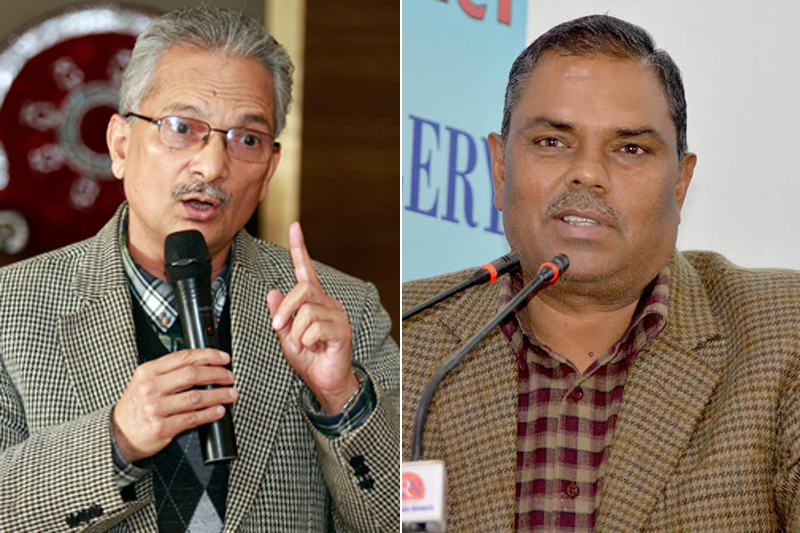FSF-N, NSP-N parties unify
Kathmandu, May 4
The Upendra Yadav-led Federal Socialist Forum-Nepal and Baburam Bhattarai-led Naya Shakti Party-Nepal officially merged today.
The unified party will be christened Samajwadi Party Nepal. It will have 17 members in the House of Representatives, equal to that of Rastriya Janata Party-Nepal, the third largest party in the Parliament.
Bhattarai and Yadav issued a joint press release, stating that they would officially announce formation of the new party on Monday.
The unification became possible after two months of intense negotiation between the two parties.
They had held unity talks before the local elections also but they had then failed to agree on the terms of unification.
Yadav and Bhattarai expressed commitment to help institutionalise democratic republicanism by ending inequality, discrimination and exploitation on grounds of ethnicity, class, gender and region.
According to NSP-N Publicity Department Chief Bishwadeep Pandey, Bhattarai, who will lead the Federal Council of the unified party will be accorded first position in the party’s seniority list, while Yadav, who will chair the meetings of the Central Committee, will be accorded the second position.
As per the understanding, all 16 office bearers of the FSF-N and all nine members of the NSP-N Secretariat will be office bearers of the unified party.
Similarly, all members of the Central Committee of both the parties will be members of the unified party till the next general convention.
A similar model will be followed for other committees from top to bottom.
The two parties that had started unity talks two months ago reached agreement at around 12 pm last night. “In these two months, there were times when we thought we were close to reaching a conclusion but there were also times when we thought merger was not possible because of differences,” Pandey said, adding that one of the daunting issues was the NSP-N’s condition that the FSF-N should quit the government before merger. “Even till yesterday morning we were not sure about unification,” Pandey added.
FSF-N leaders told NSP-N leaders they wanted to push constitution amendment issues and if the government failed to address their demands, then they would quit the government.
“I think both parties realised it was in their interest to create a unified party when the main opposition party’s role was weak.
Both parties intend to play the role of a strong opposition,” Pandey said.
Merger between the FSF-N and NSP-N could lead to postponement of the FSF-N’s General Convention scheduled from May 11 to 13.
NSP-N Coordinator Baburam Bhattarai is the only party lawmaker in the House of Representatives.
Former prime minister Bhattarai, who was a Maoist ideologue during the people’s war launched by the CPN-Maoist from 1996 to 2005, formed his own party NSP-N after quitting the CPN-MC on 26 September 2015.
RJP-N leader Rajendra Mahato said unity between the FSF-N and NSP-N had sabotaged his party’s effort to unite all like-minded forces so as to create a strong alternative force in the country. Recently, both RJP-N and FSF-N exchanged letters offering unity talks. “Unity of all like-minded forces can create big momentum for the cause marginalised communities are championing. Unity of these two parties has dampened that hope,” Mahato added.






